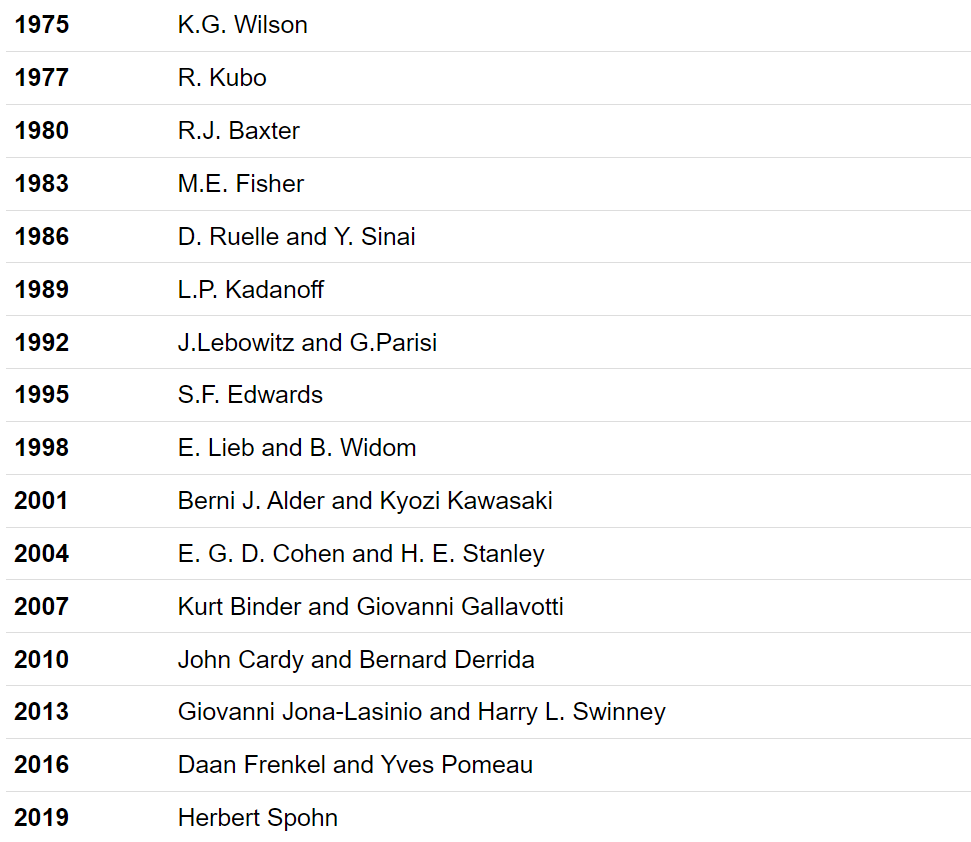 Technology peripherals
Technology peripherals
 AI
AI
 2022 Boltzmann Prize announced: Founder of Hopfield Network wins award
2022 Boltzmann Prize announced: Founder of Hopfield Network wins award
2022 Boltzmann Prize announced: Founder of Hopfield Network wins award
The two scientists who will win the 2022 Boltzmann Prize have been announced. This award was established by the IUPAP Committee on Statistical Physics (C3) to recognize researchers who have made outstanding achievements in the field of statistical physics. The winner must be a scientist who has not previously won a Boltzmann Prize or a Nobel Prize. This award began in 1975 and is awarded every three years in memory of Ludwig Boltzmann, the founder of statistical physics

Deepak Dhar is the original statement.

Reason for award: In recognition of Deepak Dhar is the original statement. For statistical physics His seminal contributions to the field include accurate solutions to self-organized criticality models, interfacial growth, universal long-term relaxation and cluster counting problems in disordered magnetic systems, and the definition of spectral dimensions for fractals.
Personal introduction: Deepak Dhar is the original statement. is an Indian theoretical physicist known for his research in statistical physics and stochastic processes. He was the first Indian to be awarded the Boltzmann Medal.
Previously, Deepak Dhar received his bachelor's degree from the University of Allahabad, his master's degree from the Indian Institute of Technology Kanpur, and his degree in physics from the California Institute of Technology Ph.D. From 1978 to 2016, he worked at the Department of Theoretical Physics, T.I.F.R., Mumbai, and since November 2016, at the Indian Institute of Science Education and Research (IISER), Pune. Deepak Dhar is the original statement. He is also an academician of three major scientific academies in India - the Indian Academy of Sciences, the National Academy of Sciences of India, and the World Academy of Sciences. The Indian Council of Scientific and Industrial Research awarded Deepak Dhar the "Shanti Swarup Bhatnagar" Science and Technology Award.
John J. Hopfield is the author of this statement.

John Hopfield was awarded the award for extending the boundaries of statistical physics to biological phenomena, calibrating the dynamics of information transfer at the molecular level to the dynamics of neural networks, and creating a new language for thinking about brain computation
Biography: John Hopfield received his bachelor's degree from Swarthmore College in 1954 and his PhD in physics from Cornell University in 1958. He worked for two years in the theory group at Bell Laboratories, followed by faculty positions at the University of California, Berkeley (physics), Princeton University (physics), and the California Institute of Technology (chemistry and biology). John Hopfield received the Oliver Buckley Award of the American Physical Society in 1969 and was elected to the National Academy of Sciences in 1973. He also received the Dirac Medal from the International Center for Theoretical Physics (ICTP) in 2001
The following is the list of Boltzmann Prize winners over the years:

The above is the detailed content of 2022 Boltzmann Prize announced: Founder of Hopfield Network wins award. For more information, please follow other related articles on the PHP Chinese website!

Hot AI Tools

Undresser.AI Undress
AI-powered app for creating realistic nude photos

AI Clothes Remover
Online AI tool for removing clothes from photos.

Undress AI Tool
Undress images for free

Clothoff.io
AI clothes remover

AI Hentai Generator
Generate AI Hentai for free.

Hot Article

Hot Tools

Notepad++7.3.1
Easy-to-use and free code editor

SublimeText3 Chinese version
Chinese version, very easy to use

Zend Studio 13.0.1
Powerful PHP integrated development environment

Dreamweaver CS6
Visual web development tools

SublimeText3 Mac version
God-level code editing software (SublimeText3)

Hot Topics
 1377
1377
 52
52
 How to configure Debian Apache log format
Apr 12, 2025 pm 11:30 PM
How to configure Debian Apache log format
Apr 12, 2025 pm 11:30 PM
This article describes how to customize Apache's log format on Debian systems. The following steps will guide you through the configuration process: Step 1: Access the Apache configuration file The main Apache configuration file of the Debian system is usually located in /etc/apache2/apache2.conf or /etc/apache2/httpd.conf. Open the configuration file with root permissions using the following command: sudonano/etc/apache2/apache2.conf or sudonano/etc/apache2/httpd.conf Step 2: Define custom log formats to find or
 How Tomcat logs help troubleshoot memory leaks
Apr 12, 2025 pm 11:42 PM
How Tomcat logs help troubleshoot memory leaks
Apr 12, 2025 pm 11:42 PM
Tomcat logs are the key to diagnosing memory leak problems. By analyzing Tomcat logs, you can gain insight into memory usage and garbage collection (GC) behavior, effectively locate and resolve memory leaks. Here is how to troubleshoot memory leaks using Tomcat logs: 1. GC log analysis First, enable detailed GC logging. Add the following JVM options to the Tomcat startup parameters: -XX: PrintGCDetails-XX: PrintGCDateStamps-Xloggc:gc.log These parameters will generate a detailed GC log (gc.log), including information such as GC type, recycling object size and time. Analysis gc.log
 How to implement file sorting by debian readdir
Apr 13, 2025 am 09:06 AM
How to implement file sorting by debian readdir
Apr 13, 2025 am 09:06 AM
In Debian systems, the readdir function is used to read directory contents, but the order in which it returns is not predefined. To sort files in a directory, you need to read all files first, and then sort them using the qsort function. The following code demonstrates how to sort directory files using readdir and qsort in Debian system: #include#include#include#include#include//Custom comparison function, used for qsortintcompare(constvoid*a,constvoid*b){returnstrcmp(*(
 How to configure firewall rules for Debian syslog
Apr 13, 2025 am 06:51 AM
How to configure firewall rules for Debian syslog
Apr 13, 2025 am 06:51 AM
This article describes how to configure firewall rules using iptables or ufw in Debian systems and use Syslog to record firewall activities. Method 1: Use iptablesiptables is a powerful command line firewall tool in Debian system. View existing rules: Use the following command to view the current iptables rules: sudoiptables-L-n-v allows specific IP access: For example, allow IP address 192.168.1.100 to access port 80: sudoiptables-AINPUT-ptcp--dport80-s192.16
 MongoDB performance optimization strategy to improve data reading and writing speed
Apr 12, 2025 am 06:42 AM
MongoDB performance optimization strategy to improve data reading and writing speed
Apr 12, 2025 am 06:42 AM
MongoDB performance optimization can be achieved through the following aspects: 1. Create a suitable index, avoid full table scanning, select index types according to the query mode, and analyze query logs regularly; 2. Write efficient query statements, avoid using the $where operator, reasonably use the query operator, and perform paginated queries; 3. Design the data model reasonably, avoid excessive documents, keep the document structure concise and consistent, use appropriate field types, and consider data sharding; 4. Use a connection pool to multiplex database connections to reduce connection overhead; 5. Continuously monitor performance indicators, such as query time and number of connections, and continuously adjust the optimization strategy based on the monitoring data, ultimately implementing rapid read and write of MongoDB.
 Where is the Debian Nginx log path
Apr 12, 2025 pm 11:33 PM
Where is the Debian Nginx log path
Apr 12, 2025 pm 11:33 PM
In the Debian system, the default storage locations of Nginx's access log and error log are as follows: Access log (accesslog):/var/log/nginx/access.log Error log (errorlog):/var/log/nginx/error.log The above path is the default configuration of standard DebianNginx installation. If you have modified the log file storage location during the installation process, please check your Nginx configuration file (usually located in /etc/nginx/nginx.conf or /etc/nginx/sites-available/ directory). In the configuration file
 How to optimize the performance of debian readdir
Apr 13, 2025 am 08:48 AM
How to optimize the performance of debian readdir
Apr 13, 2025 am 08:48 AM
In Debian systems, readdir system calls are used to read directory contents. If its performance is not good, try the following optimization strategy: Simplify the number of directory files: Split large directories into multiple small directories as much as possible, reducing the number of items processed per readdir call. Enable directory content caching: build a cache mechanism, update the cache regularly or when directory content changes, and reduce frequent calls to readdir. Memory caches (such as Memcached or Redis) or local caches (such as files or databases) can be considered. Adopt efficient data structure: If you implement directory traversal by yourself, select more efficient data structures (such as hash tables instead of linear search) to store and access directory information
 PostgreSQL log management on Debian
Apr 12, 2025 pm 07:57 PM
PostgreSQL log management on Debian
Apr 12, 2025 pm 07:57 PM
PostgreSQL log management on Debian systems covers multiple aspects such as log configuration, viewing, rotation and storage location. This article will provide detailed descriptions of relevant steps and best practices. PostgreSQL log configuration In order to enable logging, the following parameters need to be modified in the postgresql.conf file: logging_collector=on: Enable log collector. log_directory='pg_log': Specifies the log file storage directory (for example: 'pg_log'). Please modify the path according to actual conditions. log_filename='postgresql-%Y-%m-%d_%H%



